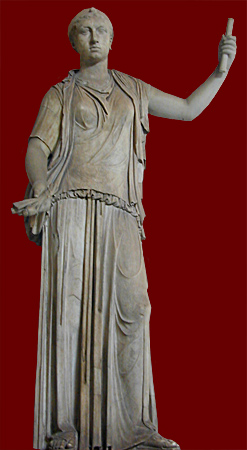 Cleopatra VII, marble statue
Cleopatra VII, marble statue Rome, Pio-Clementino, Vatican Museums
 Cleopatra VII, marble statue
Cleopatra VII, marble statue Cleopatra VII Philopator was a leading figure, both as a highly accomplished woman and astute politician, in the deciding events of the closing decades of the Roman Republic. Born 69 BCE in Alexandria, she ruled Egypt as Pharaoh for twenty one years until her self-inflicted death in Alexandria on 10/12 August, 30 BCE, when Egypt fell to the Romans under the generalship of Octavian. The most famous member of the Ptolemaic Dynasty founded by Ptolemy I Soter, she was the daughter of Ptolemy XII Auletes; her mother is unknown (possibly Cleopatra V/VI Tryphaena). At his death in 51 BCE, her father named the 18 year old Cleopatra co-regent of Egypt with her 10 year old brother, Ptolemy XIII Theos Philopator (62/1-47 BCE), who exiled her in 48, fearing her ambitions and her support of the Romans. Plutarch (Antony 27.2-4) and Cassius Dio (Roman History 42.34) describe an intellectual ability and personal magnetism more compelling than Cleopatra's physical attraction, enhanced as it was by opulent display. Possessed of enormous wealth coupled with a determination to survive the lethal politics of the Egyptian court, she married her younger brother Ptolemy XIV (59-44 BCE) in 47 and pursued relationships with the two most powerful Romans in a bid to dominate the known world: first with Julius Caesar, to whom she bore his only son Caesarion (47-30 BCE), then, after his assassination, with Marc Antony, to whom she bore three children: the twins Alexander Helios & Cleopatra Selene II and Ptolemy Philadelphus. Cleopatra was popular among her own people, who acknowledged her as Isis (Isis with Horus) for her god-like behavior: arrogance, intrigue, extravagance, self-indulgence, sexuality, savagery (among other acts, she was reported to have had her brother-husband poisoned, replacing him with Caesarion as co-regent). The Romans, among whom she lived in one of Caesar's villas in Rome from 46-44 BCE, viewed her as an aberration (see Horace l. 21: fatale monstrum), a foreigner whose notorious lifestyle undermined the traditional virtues of Roman matronae such as Antony's wife Octavia, whom he divorced in 32 BCE to marry Cleopatra and live as an Egyptian potentate. In 31 BCE Octavian declared war on Cleopatra, who fought alongside Antony at the Battle of Actium, which marked the defeat of their forces. Retreating to Alexandria followed by Antony, she waited there for Octavian's final assault on her city a year later. When his troops deserted him, Antony fell on his sword, his death followed by Cleopatra's suicide to foil Octavian's intent to display her in Rome in his triumphal parade. Horace's victory ode is written in the Alcaic Strophe. Like Octavian's declaration of war, it is focused entirely on the Queen: the first five stanzas herald Rome's eradication of a counter-cultural threat, while the final three stanzas recognize Cleopatra's masculine strength of spirit and courage in defeat. For further information, consult the many primary sources, ancient and subsequent, in English in P. Jones (2006); view Shakespeare's Antony and Cleopatra, Handel's opera Giulio Cesare in Egitto, G.B. Shaw's Caesar and Cleopatra; see also Burstein (2007), Kleiner (2005), Miles (2011), D. Roller (2010, 2018), Volkmann (1958) in the Bibliography.
Nunc est bibendum, nunc pede libero
pulsanda tellus, nunc Saliaribus
4tempus erat dapibus, sodales. ![]() hear
hear
antehac nefas depromere Caecubum
contaminato cum grege turpium
morbo virorum, quidlibet impotens
vix una sospes navis ab ignibus,
redegit in veros timores
remis adurgens, accipiter velut
mollis columbas aut leporem citus
fatale monstrum. Quae generosius
perire quaerens nec muliebriter
ausa et iacentem visere regiam
voltu sereno, fortis et asperas
28corpore combiberet venenum,
deliberata morte ferocior:
saevis Liburnis scilicet invidens
Click on the underlined words for translation aids and commentary, which will appear in a small window. Click on the icon link![]() to the right of the line for related images and information.
to the right of the line for related images and information.